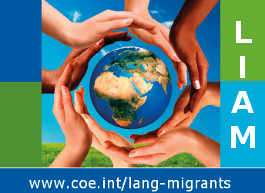Overview of section contents
Context and principles
- Context and objectives
The acquisition and evaluation of adult migrants’ communicative competences in the host country’s language(s) play a basic part in responding to challenges raised by migration and the integration of migrants in the host community.
The LIAM project was launched with a view to offering member states the means of satisfying their requirements in terms of language teaching provision and assessment, while upholding their shared values, taking account of migrants’ differentiated needs.
- Guiding principles
This section provides an extended check-list of challenges and areas to be considered by those in charge of policy and practice in the field of migrant language education, such as learner needs, learning skills, proficiency levels, incentives, languages of origin, ...
EN FR DE FI IT NO RU SL
Themes
- Language policies for adult migrants
This section provides a reminder of general Council of Europe principles, which are equally relevant to language policies concerning adult migrants. It covers issues related to the evaluation of language policy for adult migrants, including the design and quality of language courses.
EN FR DE FI IT NO RU SL - Forms of linguistic integration
The concept of “linguistic integration” and the complexity of the process is by no means limited to migrants learning the language of the host country. In this text, the varying challenges, approaches and forms are analysed and clarified.
EN FR DE FI IT NO RU SL - CEFR and profiles
The Common European Framework of Reference for Languages (CEFR) is the best-known and most widely used Council of Europe tool in the area of language education and testing.
This section explains how the CEFR describes communicative proficiency and how it can be used to construct flexible scales and design language courses. The section emphasises that it is essential to exercise caution when applying the CEFR’s descriptive scheme to the linguistic situation and language learning needs of adult migrants.
EN FR DE FI IT NO RU SL - Courses and assessment
This section is concerned with a) the provision of language courses, b) various approaches to the assessment of communicative proficiency, including language tests, and c) quality assurance in language teaching and testing.
It offers brief summaries of 16 background papers, case studies and tools concerned with courses, assessment and quality issues.
EN FR DE FI IT NO RU SL
Activities
- Conferences
The linguistic integration of adult migrants has been the subject of three intergovernmental conferences to date (2008, 2010 and 2014) which aimed at offering member states:
- a platform that enables them to reflect together on policy and practice and share experience
- opportunities for gaining an insight into resources developed by the Council of Europe to provide assistance for the development of coherent and effective policies as well as practical support for their implementation.
- Surveys
To date the Council of Europe has carried out 3 surveys among its member states on policy and practice relating to the linguistic integration of adult migrants. The aim is to identify emerging policy trends in member states and to stimulate reflection and debate on language requirements and language course provision in the light of shared principles. It is not to evaluate policy or its implementation in specific contexts.
Instruments and resources
- Instruments
This section offers tools specifically developed:
- for learners and teachers (European Language Portfolio model),
- for language course providers (also addressing quality assurance)
- and for those concerned by language learning for professional purposes
- Officials texts and guidelines
The Council of Europe has been a pioneer in addressing migration-related issues since 1968. Political contexts and globalisation have had a great influence on the way approaches have developed since then.
Language is a central aspect of the many issues raised by migration, and access to education for migrants is particularly important indeed.
This section contains a compilation of Council of Europe official texts relating to migrants’ education, as well as a recommendation of the Parliamentary Assembly on the impact of language tests. It also provides a number of policy guidelines and publications.
- Background documents and Studies
Since the launch of the LIAM project, a number of resources have been developed to assist policy makers and practitioners concerned with migrants’ language issues.
This section contains a list of the main background papers and case studies describing specific approaches to courses, assessment, etc.
- Links
This section provides links to useful resources, both in and outside the Council of Europe.
- FAQ
These Frequently Asked Questions address issues of general interest to all those concerned with language education and testing. The answers draw on Council of Europe principles, guidelines, studies and tools but also on wider resources.
Key Terms
- Key Terms
Short papers discuss concepts and approaches or introduce tools specifically developed for the context of migrants’ language education and offer further resources




